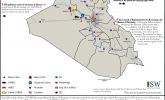 |
 |
Iraq Situation Report: August 25 - 27, 2015
The ISIS mobile defense of SVBIEDs around Ramadi affirms ISF reports of advances around the city. Over the past week ISIS responded to ISF advances west of Ramadi by ambushing and targeting ISF forward positions with SVBIEDs. ISIS also managed to kill the commander of the Iraqi Army (IA) 10th Division and the deputy commander of the Anbar Operations Command on August 27 in an attack on a forward ISF position, which was likely a targeted strike. In western Anbar the ISF has responded to this week’s surge in ISIS attacks on Haditha by launching a clearing operation in Baghdadi sub-district, partially dislodging ISIS. As the ISF fights to retake urban centers in Anbar, its ability to retain ISF-held terrain, such as Haditha, will remain an important indicator of the viability of clearing operations. The same challenge faces the ISF in northern Iraq, specifically in Baiji, Salah ad-Din. Despite ISIS’s recent offensive on Baiji, the ISF has maintained its positions and has reported advances in central Baiji and surrounding villages. The announcement by the commander of the Special Operations Command of a new offensive to clear the environs of the Baiji Oil Refinery, together with PM Abadi’s visit to forward deployed forces on August 24, confirms that Baiji remains an ISF priority. In Kirkuk, the Patriotic Union of Kurdistan (PUK) Peshmerga cleared ISIS from villages south of the PUK-held Daquq district, expanding control over terrain in the oil-rich region. ISIS has maintained a presence in the area and has launched major assaults on PUK Peshmerga forward positons near Tuz Khurmato and Kirkuk since ISIS seized terrain across northern Iraq in June 2014. PUK clearing operations south of Kirkuk likely seek to strengthen existing PUK control over the Kirkuk-Baghdad road, which also limits ISIS’s mobility and access to PUK-controlled regions of Salah ad-Din and Diyala provinces, further east. The August 27 attack by ISIS northwest of Kirkuk may constitute another example of a probing attack along the ISIS-Peshmerga frontline. ISIS may be seeking to exploit a geographic seam between the primary areas of focus for the Peshmerga forces belonging to the Kurdistan Democratic Party (KDP) and those belonging to the PUK. ISIS has demonstrated intent to probe the area recently, including the suspected chemical attack on KDP Peshmerga at Makhmur on August 11.
Prime Minister (PM) Haider al-Abadi has retained broad political support for his ongoing reform initiative. There are further indications that PM Abadi’s initiative is spurring reforms throughout the federal government. The CoR is implementing Speaker Salim al-Juburi’s anti-corruption reforms, which were passed alongside PM Abadi’s initial reforms on August 11. Juburi has threatened to hold a no-confidence vote against the Minister of Electricity over his failure to appear before the CoR to face questioning and to dismiss 30 CoR members for excessive absences. Following months of delays, the CoR passed the Political Parties Law on August 27, banning parties from receiving foreign funding and retaining paramilitary wings, among other restrictions. The Minister of Defense announced the cancellation of military contracts worth $3.4 billion on August 27 on suspicion of corruption. However, despite Ayatollah Sistani’s representative’s call on August 14 for judicial reform, the controversial head of the Supreme Judicial Council, Mehdat al-Mahmoud, vigorously defended the integrity of the Iraqi judiciary. Mahmoud announced the formation of three committees to “follow up” on reforms – a gesture that unlikely seeks to produce lasting reform. Mahmoud is a long-established ally of Nouri al-Maliki, whose State of Law Alliance (SLA) has so far lost three cabinet seats and the vice presidency in PM Abadi’s reforms. During his tenure, Maliki used the courts to block reforms, suggesting that he may pursue a similar course of action against PM Abadi as the reform initiative moves forward.
